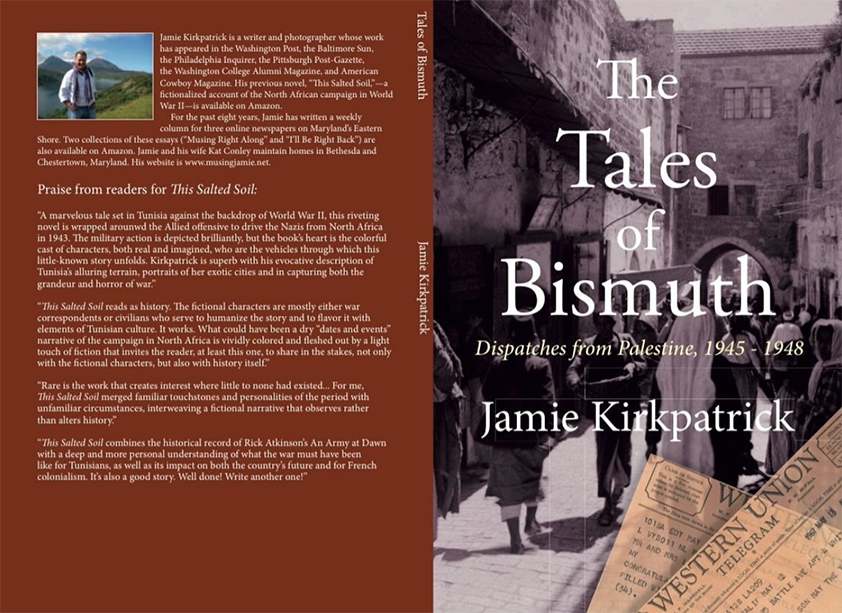 Just over a year ago, I decided to begin work on a sequel to my debut novel, “This Salted Soil.” In that book, I introduced readers to a young Irish journalist named Declan Shaw. Shaw was based in Tunisia (where I served as a Peace Corps Volunteer more than fifty years ago!), and assigned to cover the Allied invasion of North Africa in 1942, America’s bloody entry into the European theater in World War II. For more than seven months, American and British forces engaged their German and Italian adversaries in the epic battle for Tunisia. Their victory in that conflict paved the way for the invasion of Sicily and, through the painful lessons learned in the deserts and mountains of Tunisia, eventually for the Allied landings in Normandy on D-Day.
Just over a year ago, I decided to begin work on a sequel to my debut novel, “This Salted Soil.” In that book, I introduced readers to a young Irish journalist named Declan Shaw. Shaw was based in Tunisia (where I served as a Peace Corps Volunteer more than fifty years ago!), and assigned to cover the Allied invasion of North Africa in 1942, America’s bloody entry into the European theater in World War II. For more than seven months, American and British forces engaged their German and Italian adversaries in the epic battle for Tunisia. Their victory in that conflict paved the way for the invasion of Sicily and, through the painful lessons learned in the deserts and mountains of Tunisia, eventually for the Allied landings in Normandy on D-Day.
But I didn’t want Declan Shaw’s story to end in Tunisia. I wanted to explore the next chapter in his journalistic life, and so I began to write a sequel novel, one in which I sent Shaw first to Hungary to cover the siege of Budapest, and then to Palestine to cover events unfolding there. Thus was born “The Tales of Bismuth,” my personal investigation into the origins of the Arab-Israeli conflict. Little did I know…
In the book, Shaw arrives in Palestine in the summer of 1945, during the waning days of the British Mandate. Upon his arrival, he encounters his old Tunisian friend Bismuth, aTunisian Jew who has recently immigrated to Palestine. With Bismuth’s help, Shaw begins to wind his way through the origins of this ancient and heart-breaking conflict. He explores Jerusalem and Palestine, travels to Petra and Amman, and in the process, he falls in love with a place and a person. His life will never be the same.
The novel ends in 1948 with the creation of the new state of Israel and the outbreak of the war Israelis call their War of Independence, and what Palestinians have come to call their “Nakba,” their catastrophe. The question lingers: how can two peoples who claim the same land ever peacefully coexist?
Last fall, within days of finishing my manuscript, Hamas fighters invaded Israel killing scores of innocent civilians and taking more than 300 people hostage. In response, Israel launched a massive invasion of Gaza, an act which has almost destroyed the infrastructure of that territory and resulted in more than 30,000 civilian deaths. And the battle rages on…
Not only does that battle rage on, but it inches the region closer and closer to a wider, deadlier conflict. The recent exchange between Israel and Iran only serves to underscore the potential for a new conflict that threatens to engulf the region and beyond. Armageddon—the “end of days”—is a biblical concept, but today it seems as real and as present as ever.
At one point in my novel, Declan Shaw, in one of his dispatches, writes that should we fail to understand what (was) happening in Palestine in the months leading up to May, 1948, we would do so at our own peril. Back when Declan “wrote” that dispatch, little did he know how prescient his words would become.
“The Tales of Bismuth” is both timely and readable history. It is twice-dedicated: first, to all the innocent victims of this ancient and excruciating conflict, and second, to the next generation of peacemakers, whoever and wherever you are.
“The Tales of Bismuth” is available in Kindle, paperback, and hardcover editions on Amazon.
I’ll be right back.
Jamie Kirkpatrick is a writer and photographer who lives in Chestertown. His work has appeared in the Washington Post, the Baltimore Sun, the Philadelphia Inquirer, the Pittsburgh Post-Gazette, the Washington College Alumni Magazine, and American Cowboy Magazine.
His debut novel, “This Salted Soil,” and a delightful children’s book, “The Ballad of Poochie McVay,” are available on Amazon. His new novel, “The Tales of Bismuth,” has just been released.


Wilson Wyatt says
Congratulations on your new book! I’ll look forward to getting a copy,
Jamie Kirkpatrick says
Thank you, Wilson.